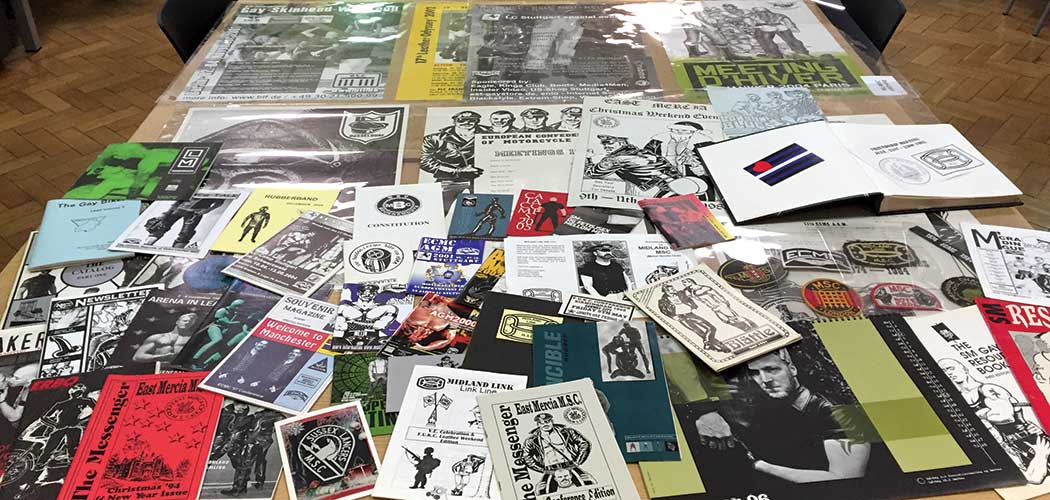LGBT history is carefully curated and celebrated at London’s fascinating Bishopsgate Institute, as David Hudson reports.
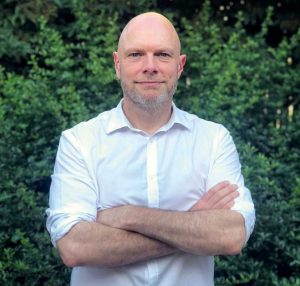
The Bishopsgate Institute in Liverpool Street is one of London’s hidden LGBT gems. Since 2011 it has been cultivating an enormous archive of LGBT history, under the watchful eye of Special Collections and Archives Manager, Stef Dickers, and his colleagues.
It’s not the first such institute to develop an LGBT archive but there are factors that set it apart from other collections, besides the large LGBTQ themed flags that hang in one of its reading rooms.
The Bishopsgate Institute was set up in 1895 as a place of culture and learning. According to Dickers, it’s always held collections relating to London (“radical politics and activism sort of stuff”). In 2011, it was approached with a collection called the Lesbian and Gay News Media archive.
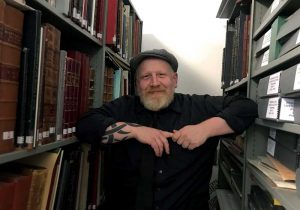
“Which is about 300,000 press cuttings from the straight press about queer history from the 1890s right through the modern day,” explains Dickers.
He was thrilled. He’d long had an interest in queer history: “That started us off on collecting LGBTQ+ history here, leading to where we are now, which is probably one of the big national repositories for queer history in the UK. New stuff comes in all the time.”
Dickers is keen for anyone with any sort of LGBT-related media or ephemera to donate. He believes too much queer history has simply been thrown away or forgotten. He’s also determined that the archives remain open to all.
“I’d say we’re definitely the most accessible as we’re not behind a university wall or in an institution where you have to fill out forms to get in. I think it’s hugely important to make queer history open to everyone, not just academics.”
He says other archives tend to prioritise donations from “the great and famous”, whereas the Bishopsgate wants to hear from everyone – even if you just want to donate old copies of Boyz, porn or club flyers from yesteryear!
“It’s not just about being angry and marching, but is also about dancing and living life and falling in love and going clubbing, but sometimes that isn’t considered as archival-worthy as going to Pride and forming a protest group.”
Since taking on the Lesbian and Gay News Media archive, the Bishopsgate holds archives from Stonewall, Lesbian and Gay Switchboard, and the UK’s only leather archive.
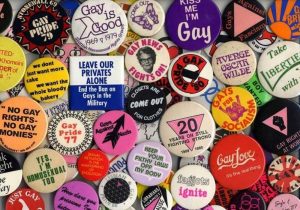
Explaining that last one, Dickers says, “I got a call from a gentleman in Birmingham in 2016 who ran a group called Midland Link MSC, Motor Sports Club. He was looking for a home for the archive of that organisation, and was finding it difficult to place it anywhere, in part due to the nature of the material.
“I got very excited and said we’d love it here at Bishopsgate and 500 posters arrived, newsletters, documents, everything you can imagine.”
Since then, other leather clubs and individuals have donated, leading to a vast collection of leather and fetish archive. Erotic artists and porn are also included in the collection.
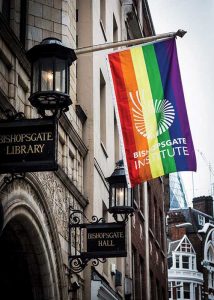
Has Dickers any personal highlights?
“We have things like Gay Monopoly. It was a board game from the 70s. It was sued by the company that makes Monopoly and was taken off the market, but someone very nicely gave us a copy.
“The things that excite me the most are the odd little things people bring in. A gentleman brought in the records of the gay vegetarian group from the 1970s, with a T-shirt and badge and Gay Vegetarians Gazette.”
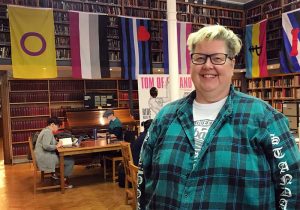
During my visit to Dickers, I bump into Ingo Cando, promoter of Wotever World.
Ingo, who is non-binary, is donating a Wotever World archive to Bishopsgate, including their notebooks, clippings and records of performance at Wotever events.
“I was moving house and had so many bags of stuff, and I knew I didn’t want to throw it away because it is my history.
“If we don’t collect our own reality, then there are people from the outside who will want to document it because they find us attractive or freaky or odd, but if we document ourselves, we do it authentically for the right reasons. That’s why I started, from the very beginning, taking photos and recording the performances that happened.”
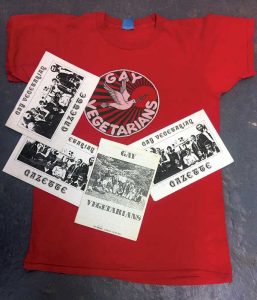
In hindsight, Ingo can see how London’s queer landscape has changed, and how those who have passed through the doors of Wotever – since being launched in 2003 – have contributed or been shaped by that.
It shouldn’t be left to straight historians to pick and choose what they think are the most important parts of LGBT history. If you have something LGBT-related that means something special to you, it might have a place at the Bishopsgate Institute.
To find out more about the Institute, go to bishopsgate.org.uk. To find out more about Wotever World, including donating to its collection, go to woteverworld.com. Anyone interested in donating to the library, pop into the Library during opening hours or get in touch at: [email protected] or 020 7392 9270. Bishopsgate Institute, 230 Bishopsgate, London, EC2M 4QH.



